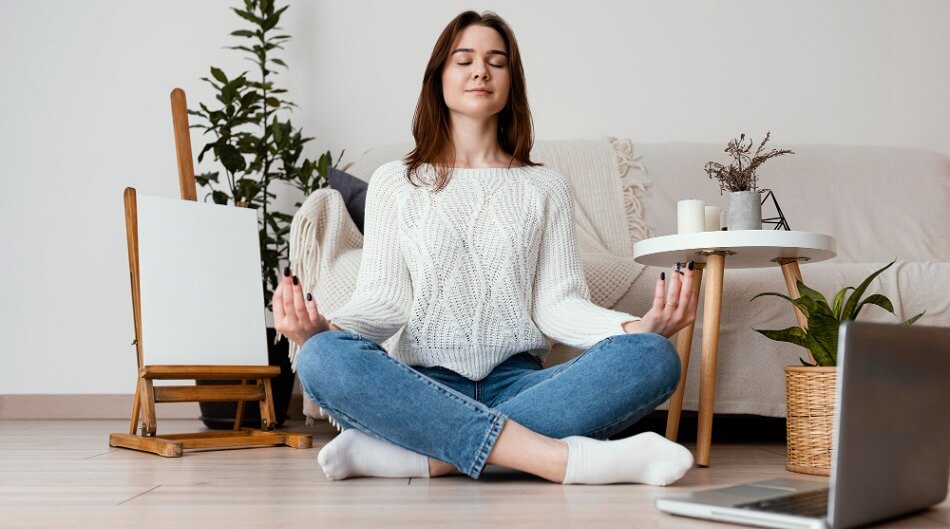
In today’s fast-paced world, where distractions and stressors abound, the ancient practice of breath meditation offers a refuge of calm and clarity. Rooted in various spiritual traditions, breath meditation, also known as mindfulness of breathing, is a simple yet profound technique that can transform the way we experience our thoughts, emotions, and the world around us.
At its core, breath meditation involves focusing one’s attention on the breath – the inhalation and exhalation – as it naturally occurs. It’s a practice that requires no special equipment or location. All that’s needed is a quiet space and a willingness to explore the inner landscape of the mind.
How to Practice:
Here’s a basic guide on how to practice breath meditation:
- Find a Quiet Space: Choose a quiet and comfortable place where you won’t be disturbed. You can sit in a chair or on the floor, using cushions to support your posture if needed.
- Posture: Sit with your spine erect but not rigid. Relax your shoulders and place your hands in a comfortable position, such as on your lap.
- Begin to Breathe: Close your eyes and start to pay attention to your natural breathing. Don’t try to control your breath; just observe it as it is.
- Focus on the Breath: Direct your attention to the sensation of the breath as it enters and leaves your nostrils or as your abdomen rises and falls. Choose one of these points to focus on.
- Stay Present: As you breathe, your mind might wander. When you notice your mind has wandered, gently and nonjudgmentally bring your focus back to the sensation of breathing.
- Nonjudgmental Awareness: As thoughts, sensations, or emotions arise, acknowledge them without getting caught up in them. Return your attention to the breath.
- Duration: Start with a short session, perhaps 5-10 minutes, and gradually increase the duration as you become more comfortable with the practice.
- Consistency: Regular practice is key. Aim to meditate at the same time and in the same place each day. Consistency helps build the habit.
- Gentleness: Be patient and kind with yourself. Meditation is a skill that takes time to develop. There’s no need to strive for perfection.
Benefits of Breath Meditation:
The benefits of breath meditation are extensive and well-documented:
1. Stress Reduction: As you tune into your breath, you activate the body’s relaxation response. This can help reduce the production of stress hormones, leading to a sense of calm and ease.
2. Enhanced Focus: Regular practice sharpens your ability to concentrate. You learn to direct your attention intentionally, which can translate to increased productivity and efficiency in daily tasks.
3. Emotional Regulation: Breath meditation fosters emotional intelligence by allowing you to observe your feelings without judgment. This can lead to better emotional regulation and a deeper understanding of your reactions.
4. Mindfulness: By training your mind to stay in the present moment, you cultivate mindfulness. This quality can lead to a greater appreciation of life’s simple pleasures and a reduced tendency to ruminate on the past or worry about the future.
5. Improved Well-Being: The practice of breath meditation has been linked to improved sleep, lowered blood pressure, and even pain management.
Incorporating Breath Meditation:
Incorporating breath meditation into your routine doesn’t have to be time-consuming. Even a few minutes each day can yield noticeable benefits. Here’s a simple way to get started:
1. Set Aside Time: Dedicate a specific time for your meditation practice. It could be in the morning to set a calm tone for the day or in the evening to unwind.
2. Choose a Comfortable Space: Find a quiet space where you won’t be interrupted. Sit or lie down in a comfortable position.
3. Start Small: Begin with just a few minutes of focused breathing. As you become more comfortable, gradually extend the duration of your sessions.
4. Be Patient: Remember that meditation is a skill that develops over time. It’s normal to have days when your mind feels particularly restless. Be patient with yourself and return to the breath whenever your mind wanders.
In conclusion, Breath meditation offers a refuge from the busyness of life and a doorway to inner peace. Whether you’re seeking stress relief, improved focus, or a deeper connection with yourself, this practice holds the potential to transform your well-being. By dedicating a few moments each day to observe your breath, you embark on a journey of self-discovery, one that can lead to greater presence, clarity, and harmony in all aspects of life.












































